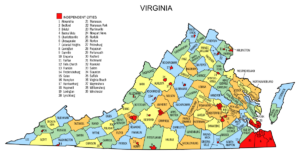 Two months out from Election Day 2023, perhaps the most exciting contest to watch is the battle for control of the Virginia State Legislature.
Two months out from Election Day 2023, perhaps the most exciting contest to watch is the battle for control of the Virginia State Legislature.
At this moment, Democrats hold a narrow 22-17-1 majority in the State Senate while the Republicans enjoy a slim 50-46 majority in the House of Delegates, so both chambers could conceivably be won by either party.
Ballotpedia identifies eight battleground Senate races, four seats represented by Democrats (SD-22, SD-24, SD-30 and SD-31) and four seats represented by Republicans (SD-4, SD-16, SD-17 and SD-27). They also classify seven battleground House races, with four districts held by Republicans (HD-22, HD-65, HD-82 and HD-97) and three districts held by Democrats (HD-21, HD-57 and HD-89).
The Virginia GOP is aiming to duplicate what the Democrats accomplished four years ago, when they flipped two State Senate seats and six House seats to earn majorities in both chambers ahead of the 2020 Presidential cycle. Now Republicans believe that the momentum has turned in their favor.
In the wake of Glenn Youngkin’s Gubernatorial victory in 2021, Virginia Republicans are convinced that they’ve cracked the code to winning in this increasingly blue commonwealth. Their formula involves finding moderate candidates who will focus on social issues like ‘wokeness’ in schools instead of national issues such as Donald Trump.
Democrats, on the other hand, have their own strategy honed during the 2022 midterm cycle. Their game plan involves tying local GOP candidates to controversial national Republicans like Trump while also highlighting abortion rights as a central campaign issue.
After all, ever since the Supreme Court overturned Roe in the Dobbs decision, public opinion and election referendums have consistently shown a rise in pro-choice support and enthusiasm in the national electorate.
Nevertheless, Gov. Youngkin is proposing a 15-week abortion ban, which he’s presenting as a “consensus” approach. Such a law, however, would still be the most restrictive abortion policy in any state which voted for Hillary Clinton in 2016. As a result, Virginia is bound to be the primary battleground for the nation’s newly energized pro-choice forces.
On that note, President Biden and the DNC are also treating these races as a national priority. Earlier this month, Biden directed the DNC to allocate an additional $1.2 million in funds to the Virginia legislative races. That brings the DNC’s total investment to $1.5 million so far, a mammoth sum compared to the meager $100,000 they spent in 2019.
So how are Gov. Youngkin and the Virginia Republicans planning to counter this offensive? Well, a former Youngkin aide is starting a polling outlet that will release weekly results from surveys of the commonwealth’s voters. The organization’s goal is that these polling numbers will then drive the media narratives in these contests.
Finally there’s the 2024 cloud hovering over these 2023 races, and what role Glenn Youngkin might play in the Presidential contest. With Ron DeSantis’ campaign continuing to fade, those donor calls for Youngkin to throw his hat into the ring are bound to grow even louder.
Notwithstanding the fact that Youngkin is still refusing to entertain a 2024 bid, if Virginia Republicans do actually win a trifecta, there’ll be intense pressure for him to change his mind. A defeat, on the other hand, would snuff those embers out once for all. Either way, though, it’s incredibly implausible that a late entrant could upset the race just weeks before the Iowa Caucus. Of course, given the unique legal perils facing the GOP front-runner, no scenario can be completely ruled out.
As you can see, the battle for control of the Virginia Legislature is destined to be exciting, and you can be sure we’ll be keeping a close eye on these contests over the next months. So stay tuned to Decision Desk HQ all the way up to Election Night on November 7th.